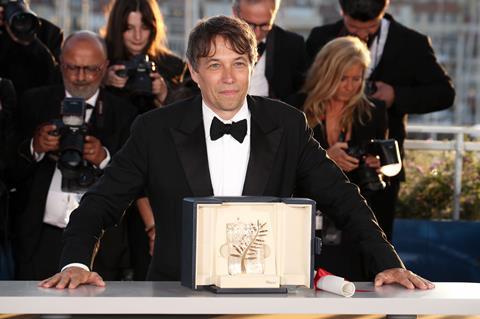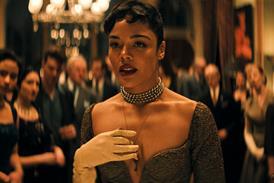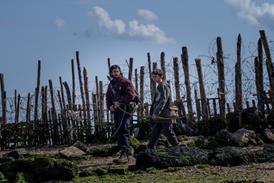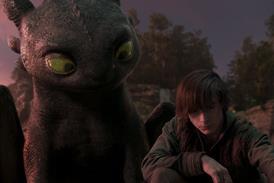
Even by the standards of Cannes, the figures reeled off by delegate general Thierry Fremaux at today’s line-up announcement were arresting.
He reckons that one-third of the global industry’s output was submitted to the festival, at just under 3,000 titles (2,909). That’s a lot of selection power wielded by just one entity in a single sector, if you were to look at it purely in economic terms. Is it healthy? Cannes, of course, would say yes.
The festival is red-hot at the moment, that much is clear. So it’s no surprise that submissions were up – almost double the 1,500 of a decade ago, said Fremaux. Last year’s sexed-up line-up was super-successful as the rest of the film industry floundered around strikes and superhero fatigue. Undoubtedly, there will be more attendees – public, industry and press – in Cannes this year as a result.
2024 marked the second time a Palme d’Or winner took the Oscar for best picture in five years. Sean Baker’s Anora was one of the three front-runners from Cannes in the final Oscar shortlist of 10 (see also Emilia Perez and The Substance). Previously, Parasite was the first non-English language feature to take that honour after winning on the Croisette in 2019. Four out of the five films shortlisted in the international feature category also premiered at Cannes in 2024: Emilia Perez, The Seed Of The Sacred Fig, The Girl With The Needle and Flow.
Cannes has always flown the flag for global cinema, but even as it denies streamers a place in its Competition selection, the melting-down of the industry they have provoked helps the festival (an embrace of subtitled features being just one of the unexpected consequences). Cannes Palme d’Or winners have always been influential; now they’re also financially successful, a big part of the lucrative awards ecosystem – not something you could have said when Uncle Boonmee Who Can Recall His Past Lives won in 2010 or Winter Sleep in 2014, when submissions were half of today.
All eyes are always on the Cannes Competition, but the hard fact is that with one-third of the global industry’s entire output applying, it’s more than eyes. It’s wallets too.
A superficial look – which is all that’s available in advance of screenings – at Fremaux and co’s selection for 2025 indicates a trend towards political drama and away from sex, which certainly befits the times we find ourselves in. There’s a sharp political thread running through Competition, from Two Prosecutors, a rare drama by Sergei Loznitsa set during the Stalin terror, to Ari Aster’s Eddington, about a Texas election for sheriff, Tarik Saleh’s political thriller Eagles Of The Republic and Kleber Mendonça Filho’s The Secret Agent set during Brazil’s military dictatorship in the 1970s.
Fremaux certainly tells the truth when he says Cannes is loyal to its auteurs – like a book publisher, he explained, in a stream-of-consciousness press conference – but two-time Palme d’Or winners the Dardenne Brothers are the oldest directors in this year’s line-up with The Young Mother’s Home, at the ages of 71 and 73.
Last year, Fremaux really wheeled out the veterans. For all the youthful whizz-bang of Coralie Fargeat and Sean Baker, he also featured films by Paul Schrader (then aged 77), David Cronenberg (81) and Francis Ford Coppola (85) in a line-up otherwise stacked with familiar names from previous editions (Sorrentino, Honore, Hazanavicius, Serebrennikov, Jia Zhangke and Gilles Lelouche). And none of those titles hit. This year, for the first time ever, Cannes will open with a debut film, directed by a woman – Partir Un Jour by Amelie Bonnin.
Six female directors in Competition – or just under a third of the titles announced to date – glides with Fremaux’s estimation that 32 percent of submitted films were directed by women. Two films starring the UK’s Josh O’Connor (The Mastermind and The History Of Sound). One American director (Richard Linklater) taking on the French New Wave with a film about the production of Breathless. And several films featuring fractured families, from Carla Simon’s Romeria, about a teenager trying to find her father, to Hafsia Herzi’s La Petite Derniere, about a lesbian Muslim woman dealing with her family’s disapproval.
So, no sex motels (Motel Destino); no Trump (The Apprentice); no body horror, no singing gangsters and no prostitutes – that we know of. But a lot that promises to reflect where the world is on an intimate level.
With an eager industry that has become somewhat financially addicted to Cannes, this Competition may provoke a lot of chatter at the end of the first weekend about how it’s all not as good as last year (which, according to everyone last year, wasn’t as good as the banner 2023 with The Zone Of Interest and Anatomy Of A Fall).
There’s more to come, said Fremaux, but it’s worth remembering that good and lucrative aren’t always aligned. Securing one of these coveted berths is a success of wild imagining for filmmakers. Let’s tread softly, then, because we tread on their dreams.






























No comments yet